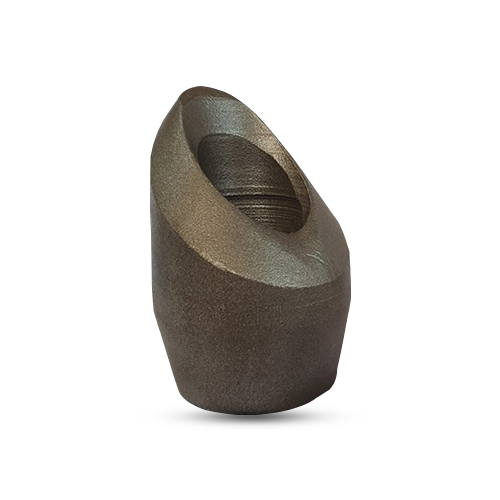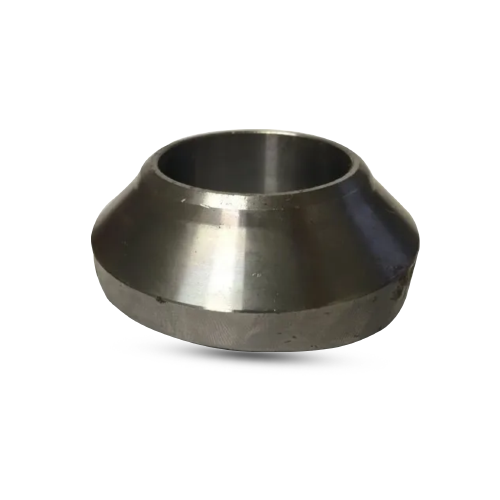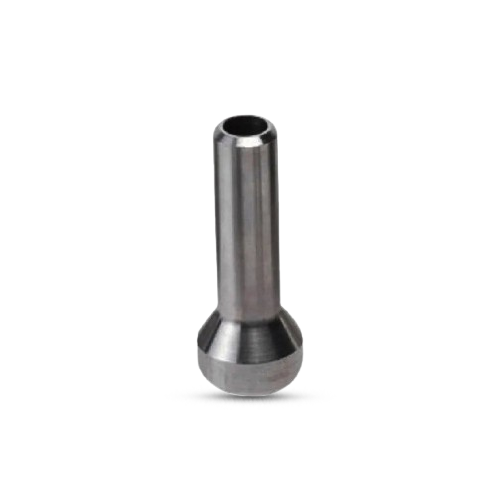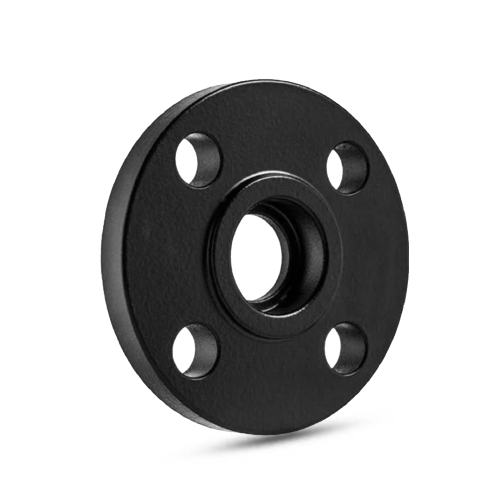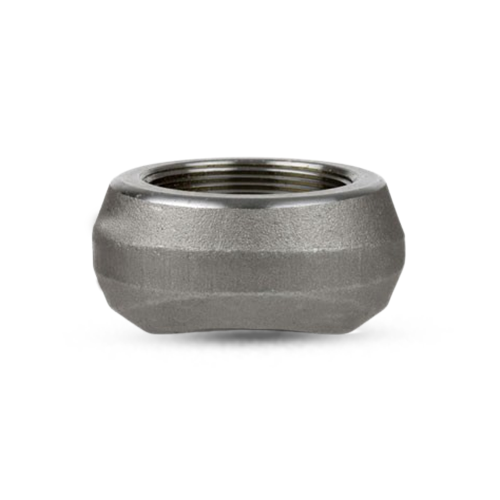Carbon Steel Branch Outlets
Home - Carbon Steel - Carbon Steel Branch Outlets
Carbon Steel Branch Outlets
EBY Fasteners provides a wide range of carbon steel branch outlets to power your piping projects, offering diverse technical specifications and grades to match the demands of your application
Versatility of Carbon Steel Branch Outlets
Carbon steel’s unique mix of strength, versatility, and cost-effectiveness makes it an excellent choice for branch outlets in a variety of piping applications. EBY Fasteners provides a variety of carbon steel branch outlets in three grades (low, medium, and high) to fulfill different needs. These outlets provide dependable solutions for changing flow directions, transferring fluids, and incorporating smaller pipes into core piping systems in a variety of sectors
- For Low Carbon Steel Branch Outlet (Mild Steel) : This grade of carbon steel branch outlets comprises 0.05% to 0.3% carbon, with trace levels of manganese and silicon. It's extremely ductile and weldable, allowing for simple shape and manufacturing. While lower in strength than other classes, low carbon steel is appropriate for structural components, general fabrication, sheet metal, automotive parts, and everyday goods
- For Medium Carbon Steel Branch Outlet : This grade of carbon steel branch outlets contains somewhat more carbon (0.3% to 0.6%) and more manganese. This composition provides a suitable balance of strength, hardness, and ductility. It is frequently heat-treated to increase its characteristics. Medium carbon steel is widely used in axles, gears, shafts, machine parts, railway components, and structural elements requiring higher load-bearing capability
- For High Carbon Steel Branch Outlet : High carbon steel branch outlets are durable, strong, and wear resistant, with carbon content ranging from 0.6% to 1%. It may include additional alloying elements for particular qualities. While less ductile and more difficult to weld than lower carbon grades, it's ideal for cutting tools, springs, wire, wear-resistant components, and applications that require toughness
- Technical Considerations : Selecting the right carbon steel grade for the branch outlets depends on your project's specific requirements. Key factors to consider include tensile strength, yield strength, ductility, and weldability
Technical Specifications
EBY Fasteners adheres to the following industry standards for carbon steel branch outlets :
- ASTM A234 : This standard covers the manufacturing of wrought carbon steel fittings, including Weldolets, Sockolets, and Thredolets. It dictates chemical composition requirements, mechanical property limits (strength, ductility), and testing procedures to ensure branch outlets meet performance expectations for use in moderate to high-temperature piping systems
- MSS SP-97 : This standard focuses specifically on integrally reinforced forged branch outlets of various connection types (socket weld, threaded, buttweld). It outlines design requirements, dimensional specifications, tolerances, and pressure ratings. Adherence to this standard guarantees the structural integrity and proper fit of these outlets within piping systems
- ASME Boiler and Pressure Vessel Code (BPVC) : This code sets strict rules for designing, building, and testing boilers, pressure vessels, and components like branch outlets. It ensures safety and reliability in high-pressure systems
- API 600 : This standard covers the design and manufacturing of steel gate valves used in the petroleum industry. It may apply to branch outlet piping systems where these valves are used
- API 602 : This standard focuses on smaller steel gate valves for high-pressure applications. It provides design and material guidelines relevant to piping systems integrating these valves and branch outlets
Customized Branch Outlets as per project's specific requirements
- Low Carbon Steel (Mild Steel) Branch Outlet : Low carbon steel (mild steel) used for branch outlets typically contains 0.05% to 0.30% carbon, 0.25% to 0.90% manganese, 0.15% to 0.40% silicon, with sulfur and phosphorus content limited to a maximum of 0.050% and 0.040%, respectively
- Medium Carbon Steel Branch Outlet : Medium carbon steel used for branch outlets typically contains 0.30% to 0.60% carbon, a higher manganese content of 0.60% to 1.65%, and 0.15% to 0.60% silicon, while sulfur and phosphorus levels are kept at or below 0.050% and 0.040% respectively
- High Carbon Steel Branch Outlet : High carbon steel used for branch outlets typically contains a carbon content of 0.60% to 1.00%, with manganese ranging from 0.30% to 0.90%, and silicon content up to 0.60%. Sulfur and phosphorus are strictly limited to a maximum of 0.050% and 0.040%, respectively
- AISI 1015 Hot Rolled, Normalized (1700 F), Annealed (1600 F) : This grade offers good ductility, with an elongation of 37.0%. It has a tensile strength of 61,000 psi and a yield strength of 45,500 psi. Its hardness is 121 Bhn
- AISI 1020 Hot Rolled, Normalized (1600 F), Annealed (1600 F) : This grade provides a slightly higher tensile strength of 65,000 psi compared to AISI 1015. It maintains good ductility with an elongation of 35.8% and has a yield strength of 48,000 psi. Its hardness is 131 Bhn
- AISI 1030 Hot Rolled, Normalized (1700 F), Annealed (1550 F) : This grade demonstrates the highest tensile strength (80,000 psi) among the three. It has a yield strength of 50,000 psi and exhibits moderate ductility with 32.0% elongation. Its hardness is 149 Bhn
The dimensional tolerances of carbon steel branch outlets are based on standards such as the MSS SP-97. This standard provides the dimensions, finish, marking, materials, and strength requirements for 90 and 45 degree integrally reinforced forged branch outlet fittings of buttwelding, socket welding, and threaded types
- Pressure Ratings : The pressure ratings of carbon steel branch outlets, such as the A105 outlets, are typically specified by the manufacturer and are based on standards like the MSS SP-97. These ratings indicate the maximum pressure that the branch outlet can withstand under normal operating conditions. The pressure ratings are usually denoted in pounds per square inch (psi) or kilopascal (kPa)
- Carbon Steel A105 Outlets : Some carbon steel A105 outlets branch fittings have pressure ratings of 3000#, 6000#, and 9000#. The A105 specification refers to the type of carbon steel used to manufacture these fittings. The numbers 3000#, 6000#, and 9000# refer to the pressure ratings in pounds per square inch. This means these fittings can withstand pressures of 3000 psi, 6000 psi, and 9000 psi respectively
- Style 920 and 920N : These are specific styles of branch outlets. All sizes of these styles are rated at 500 psi (3450 kPa) working pressure on Schedule 10 and 40 carbon steel pipe. The term “Schedule” refers to the thickness of the pipe wall and, therefore, its capacity to withstand pressure. Schedule 10 and 40 pipes have different wall thicknesses, with Schedule 40 being thicker than Schedule 10. Despite the difference in wall thickness, both Schedule 10 and 40 pipes of Style 920 and 920N can withstand the same pressure of 500 psi
Mechanical Standards
Key Standards Organizations
- ASTM International : Develops numerous standards covering mechanical testing and properties of carbon steel products
- American Society of Mechanical Engineers (ASME) : Focuses on components for pressure vessels, piping, and related systems. Includes specifications with mechanical property requirements
- International Organization for Standardization (ISO) : Creates international standards, including standards related to the mechanical testing of steel
Important ASTM Standards for Mechanical Properties
- ASTM A370 : Standard Test Methods and Definitions for Mechanical Testing of Steel Products. This foundational standard outlines procedures for
- Tensile testing
- Hardness testing (Brinell, Rockwell, Vickers)
- Impact testing
- ASTM E8/E8M : Standard Test Methods for Tension Testing of Metallic Materials.
- ASTM E10 : Standard Test Method for Brinell Hardness of Metallic Materials
- ASTM E18 : Standard Test Methods for Rockwell Hardness of Metallic Materials
Mechanical Properties in Branch Outlet Standards
- ASTM A234 : (Piping fittings) may specify minimum tensile strength, yield strength, and elongation
- MSS SP-97 : (Integrally reinforced branch outlets) may reference ASTM A370 for testing procedures and potentially include some mechanical property limits
Additional Relevant Standards
- ASTM A105 : Standard Specification for Carbon Steel Forgings for Piping Applications. Often referenced in conjunction with branch outlet standards, as it sets requirements for the base forged material used
- ASTM A961 : Standard Specification for Common Requirements for Steel Flanges, Forged Fittings, Valves, and Parts for Piping Applications. Provides general requirements often applicable to branch outlets
- ASME B16.9 : Standard for Factory-Made Wrought Buttwelding Fittings. May be relevant if buttwelded branch outlets are used
- ASME Boiler and Pressure Vessel Code : Contains various sections with material and design requirements that may apply to branch outlets used in pressure systems


